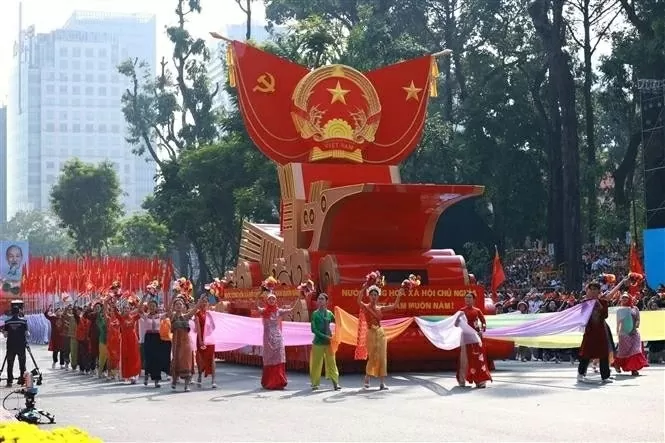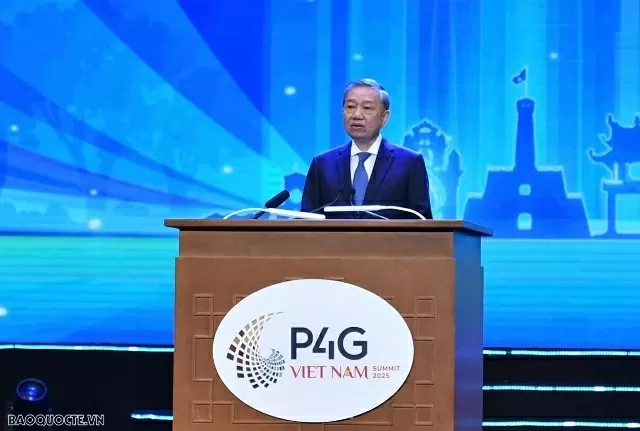
50th anniversary of National Reunification: Vietnam's imprints on the global stage
Latest
 |
| Since the reunification of the country on April 30, 1975, along its journey of Doi Moi (Renewal), integration, and development, Vietnam has demonstrated resilience and intelligence. (Photo: Vietnam.net) |
Since the reunification of the country on April 30, 1975, along its journey of Doi Moi (Renewal), integration, and development, Vietnam has demonstrated resilience and intelligence, gradually overcoming challenges and establishing official relations with various countries and international organizations.
Increasingly Diverse and Comprehensive Diplomatic Relations
During the process of building socialism and implementing Doi moi policy (from 1975 to the present), Vietnam has achieved many significant accomplishments. These have played a vital role in breaking the blockade and embargo, firmly safeguarding national sovereignty and territory, maintaining a peaceful and stable environment, enhancing the country’s international standing, and attracting resources for development.
Vietnam's accession to the United Nations in 1977 held major political and legal significance, affirming the full status of a unified, independent Vietnam on the international stage. Vietnam’s multilateral efforts—particularly in promoting dialogue with the Association of Southeast Asian Nations (ASEAN, starting in 1985) and the 1991 Paris International Conference to resolve the Cambodia issue—led to major breakthroughs. These achievements contributed to opening up Vietnam’s relations with other countries, especially major powers such as China and the United States, as well as international and regional organizations.
Vietnam’s accession to ASEAN in 1995 marked its regional integration process, while its accession to the World Trade Organization (WTO) after nearly 12 years of negotiations was a milestone signifying Vietnam's full and comprehensive integration into the global economy.
Today, Vietnam has transformed from a nation once isolated and besieged into a member of nearly all major multilateral cooperation and linkage mechanisms—from global levels (United Nations, WTO, World Bank, IMF), to interregional forums (Asia-Europe Meeting, Asia-Pacific Economic Cooperation), and regional frameworks (ASEAN, Asian Development Bank). It now maintains a network of free trade agreements (FTAs) with most of the world’s leading economic and trade centers.
Alongside this process, Vietnam has transformed from a poor, underdeveloped country into a regional growth leader in Asia after nearly 40 years of reform and deep international integration. It is now a dynamic developing nation, ranked 35th among the world’s largest economies.
By the end of the first quarter of 2025, Vietnam had established diplomatic relations with 194 countries (compared to just 11 in 1954); it has economic and trade relations with approximately 230 countries and territories. Vietnam has formed Comprehensive Strategic Partnerships, Strategic Partnerships, and Comprehensive Partnerships with 34 countries, including all five permanent members of the United Nations Security Council and all G7 economies.
Vietnam participates in a network of over 500 bilateral and multilateral agreements, including 17 next-generation free trade agreements (FTAs) with more than 60 major countries and economies, covering 50–60% of global GDP and trade. More than 70 countries now recognize Vietnam as a market economy.
Deepening development of external economic relations
Vietnam’s consistent implementation of an independent and self-reliant foreign policy—centered on peace, cooperation, development, openness, diversification, and multilateralization of international relations—has played a crucial role. By proactively and actively integrating and expanding international cooperation across sectors, Vietnam has positioned itself as a reliable partner and responsible member of the international community. It engages in equal and mutually beneficial cooperation with all nations based on the fundamental principles of the UN Charter and international law. This strategic orientation has helped maintain a peaceful and stable environment for socio-economic development, elevate Vietnam’s international standing, and serve national and ethnic interests. It has enabled Vietnam to achieve major, historically significant accomplishments not only in diplomacy but also in the economy.
Vietnam is now ranked among the world’s top 20 emerging markets and largest trading economies. In 2024, the country’s total import-export turnover was estimated at 807.7 billion USD—its highest ever—marking a 15% increase from the previous year and 2.5 times higher than the Government’s original target. Of that, exports exceeded 400 billion USD (up 14.4%), and imports rose by 16.4%. The trade balance recorded a trade surplus for the ninth consecutive year, reaching a near-record 25 billion USD. Vietnam is also a global leader in exports of textiles and garments, footwear, rice, coffee, pepper, cashews, and rubber. In 2024, 36 export items each earned over 1 billion USD, accounting for 94.1% of total export value.
On the investment front, Vietnam is among the top 15 countries globally in attracting foreign direct investment (FDI). By the end of 2024, the country hosted more than 40,800 active FDI projects with a total registered capital of approximately 487 billion USD. Vietnam has been, is, and will continue to be deeply integrated into regional and global supply chains.
 |
| 50 years of national reunification: Vietnam's Emblem at the commemorative parade in Ho Chi Minh City. (Photo: Nguyen Hong) |
A landmark development in 2024 was the strategic partnership between the Vietnamese Government and NVIDIA—a leading U.S.-based technology firm—to establish an Artificial Intelligence (AI) Research & Development Center and AI Data Center in Vietnam. This initiative is regarded as a historic turning point, aiming to position Vietnam as a leading hub for AI research and innovation in Asia.
Vietnam has also emerged as a standout destination in global tourism map. Ranked 25th in the world for tourism resource potential, the country boasts numerous recognizedtangible and intangible heritage sites. In May 2024, the U.S.-based magazine Travel + Leisure named Vietnam one of the eight most affordable and livable countries for retirees.
The Vietnamese economy has fully recovered and returned to pre-COVID-19 growth levels, particularly in industrial production, trade services, and import-export activities. The country now ranks 35th globally in economic size, with well-controlled state budget deficits, public debt, government debt, and foreign debt. As a result, leading international credit rating agencies continue to rate Vietnam’s sovereign credit with a “stable” outlook.
According to the World Bank, Vietnam is considered a global economic star, with an average annual per capita GDP growth rate of 5.3% from 1990 to 2021—the fastest in the region after China. In 2024, Vietnam once again ranked among the world’s top-performing economies in terms of growth rate.
The International Monetary Fund (IMF) identified Vietnam as the only Southeast Asian nation in the global top 10 for projected economic growth, with an average 6.4% annual growth forecast from 2024 to 2029. This positions Vietnam among the fastest-growing emerging markets, opening up major opportunities for attracting foreign investment and enhancing its role in regional and global economic development.
Vietnam is among the countries that have made the most significant progress in the past decade on the Global Innovation Index (GII), ranking among the fastest-improving middle-income economies in innovation performance. The country continues to advance in various other critical international rankings, including the Global Competitiveness Index (GCI), and indexes measuring contributions to global growth, livability, safety, happiness, investor protection, and global reputation.
 |
| 4th P4G Smmit 'Sustainable and People-Centred Green Transition' opens in Hanoi: General Secretary To Lam delivered remarks.(Photo: WVR) |
Since 2021, Vietnam has officially been classified as a country with “moderate economic freedom”, with an overall score of 61.7. It ranked 17th out of 40 economies in the Asia-Pacific region and 90th out of 184 globally on the Heritage Foundation’s 2021 Index of Economic Freedom. According to the United Nations, Vietnam’s Happiness Index rose 11 places in 2024, ranking 54th out of 143 countries.
Vietnam actively monitors global developments and adopts responsive, adaptive policies—prioritizing economic growth, promoting business activity, and enhancing the strength and stability of the banking and capital markets. It continues to reform to improve productivity, ensure long-term, sustainable growth, and effectively manage risks, all while creating a favorable environment for investors.
The country is driving a strategic economic restructuring focused on fast and sustainable growth rooted in science, technology, innovation, and labour productivity improvements. The long-term goal is to build a more independent and self-reliant economy, deeply and effectively integrated into the global economy.
Vietnam is emphasizing on innovation and start-up ecosystems; development of new sectors such as the digital economy, green growth, circular economy, semiconductors, artificial intelligence (AI), and high-tech agriculture; Establishment of new economic models, including international/regional financial centers and free trade zones in key localities.
Moreover, a revolution in streamlining political and administrative structures has energized the business community and fostered its confidence. This effort serves not only as a strategic objective but also as a transformative institutional driver—positioning Vietnam to enhance its diplomacy and move confidently into a new era of national advancement.













